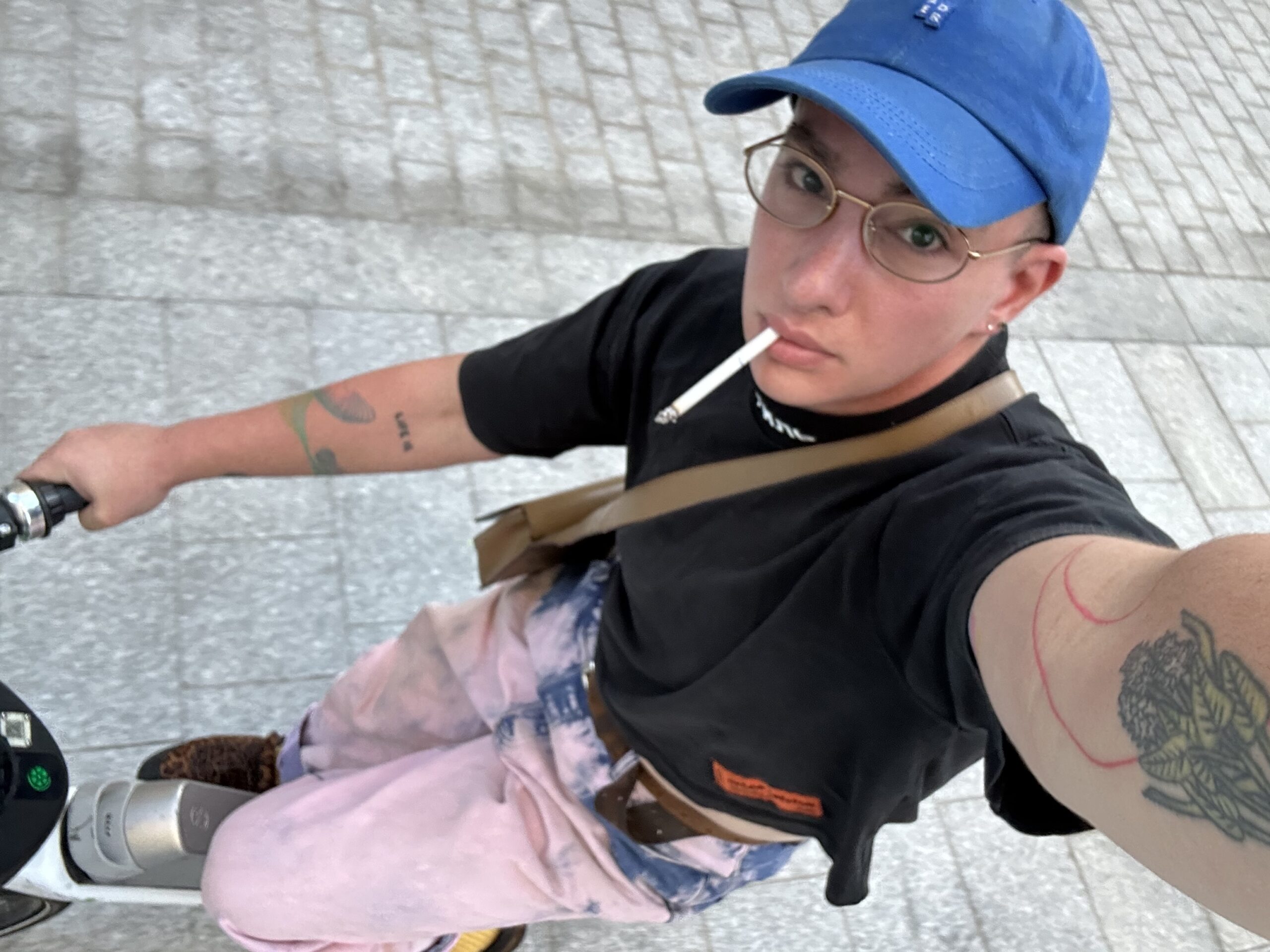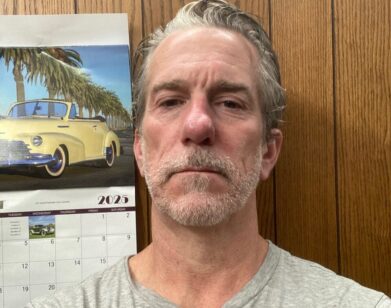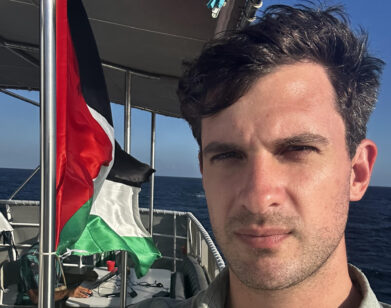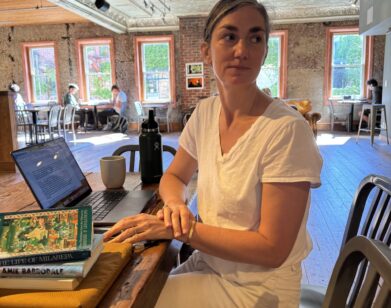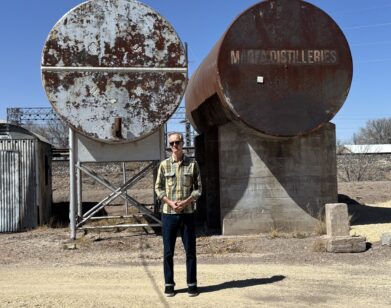PILLS
P.E. Moskowitz on Hangovers, Hysteria, and America’s Chemical Romance
I first met the writer P.E. Moskowitz at a reading we both did at Honey’s last winter. They read from their new book Breaking Awake: A Reporter’s Search for a New Life, and a New World, Through Drugs, which comes out today. The book, which takes readers to the front lines of this country’s mental health crisis, is funny, smart, and profound. It reckons with the role drugs, prescribed and non-prescribed, play in our society, and the potential ways that we can escape capitalist cycles in order to change our minds and—ideally—break free. Or rather: awake! They also write the substack Mental Hellth, an equal parts probing and soothing inquiry into how we can possibly exist in this world. When we spoke on a yawn-y summer day a month before their book’s publication, Moskowitz had just finished moving into a new apartment and I had just taken an herbal supplement called “Arouse Vigor.” We talked about hangovers, spiritual reclamation, and getting (divinely) snatched.
———
ROSA SHIPLEY: I was going to ask you how you were and then I was like, “Is that even a real question anymore?”
P.E. MOSKOWITZ: The honest answer is that I’m hungover, because I had friends over last night. And I feel like being hungover is a distraction. Your brain is on low-power mode, so you can’t actually think about how horrible everything is all the time. So maybe the benefit of drugs or alcohol is in the after-effects more than the effects.
SHIPLEY: That’s interesting. I saw—forgive me—a TikTok of this woman talking about the shame that we feel around drugs, medication, and substance use. She was very woo-woo, but why not? And she was like, “All of these feelings exist inside of us already, but what we take are mechanisms to achieve the same frequency that already exists in us.”
MOSKOWITZ: Mm-hmm.
SHIPLEY: And I think a hangover is a down frequency, a subdued frequency. And also, a hangover is sort of a path to memory. You are sort of processing what has happened.
MOSKOWITZ: Yeah, yeah. I mean, I get extremely woo-woo, so I appreciate a woo-woo TikTok as much as anyone. But yeah, I feel like everything—every drug, every experience being high on whatever substance—you’re just putting yourself in a different state. But you’re still the same person. You’re still grappling with the same issues. And drugs can never fix those issues, just like being in therapy can never cure your bad boyfriend or the job you hate. But it can put you in a different frequency or headspace. And I think the problem is: how many times can you have the same revelation over and over again? Even if you leave your bad boyfriend and you quit your stupid job, you still exist in capitalism. So you can change your perspective on that only so many times before you’re like, “Okay, now what?” Which is kind of where the book ends.
SHIPLEY: Well, first of all, I’m glad that this is a safe space for woo-woo, because I think it’s one of the only answers at this point. But as a writer, the scary part of woo-woo is I’ve always been afraid that people will not think that I’m intelligent when I reveal that I am in tune with or am down to consider X, Y, Z. As a journalist, how do you hold that and feel the pressure of credibility when we also deal with the transcendent or psycho-spiritual aspects of the work?
MOSKOWITZ: With all due respect to other journalists, fuck that. [Laughs] That’s what most of life is, the woo-woo stuff. I’m about to sound like a right-winger, so give me time to work through the thought I’m about to say, but these New York Times-ian, atheist intellectuals in New York City are convinced that they’re somehow better because they’re cut off from their emotional core in some way. But most people in the world are very invested in their own emotional core. Half of life is emotions and spiritual shit and understanding your spiritual place in the world, and we cede that to the right, I think, when we ignore it. We allow that to just be used by the charlatans and mega-pastors when we’re just like, “This stuff actually isn’t important or material.” Does that make any sense?
SHIPLEY: That makes perfect sense. Something that I loved about your book was the idea that that’s the only logical reaction—the understanding that it’s more sane to be crazy right now, to try these different salves. That’s much more divinely reasonable and pragmatic than anything else.
MOSKOWITZ: Yeah. And I think it’s also our material responsibility too, because the less connected you are to all of that stuff, the more you kind of externalize it. It’s why men end up yelling at people more than women do—it’s because they’re not in touch with their emotions. They blame everything on everyone else. And I think that’s true on a global level too, where if you’re not in touch with your spirituality, the woo-woo side of you, then you end up placing the blame for everything—the oppression and strife you feel from living in the shitty world we live in—onto other people, or misplacing it. So I feel like the more in touch you are with your emotions, the more you realize how badly the world is affecting you, the more clarity you have on what the actual problem is.
SHIPLEY: In the book you write about a nervous breakdown, and I’ve been thinking a lot about the concept of hysteria. I’m obsessed with hysteria. I think we’re all hysterical, in a genderless way. How do you feel about the quality of the breakdown in retrospect?
MOSKOWITZ: It’s like having a bad trip, in a way. That’s what my nervous breakdown felt like—having a bad trip, but for a really long time. And for so long, I tried so hard to just get out of it. It took me so long to stop fighting and just let my body go through this tunnel and come out the other side of it. And now I feel pretty firmly on the other side, although I also think there’s no other side. Life is like a series of tunnels, of perspectives shifting and realizing what your needs are. The more you stop thrashing around and trying to prevent yourself from experiencing what you need to experience, the worse your life gets. The more you just accept that life is—that it’s good and bad and all of these things—the more you can just sink through the quicksand to the other side. I think we’re so invested as a culture in never allowing people to do that, because it has revolutionary potential if we did.
SHIPLEY: It takes time.
MOSKOWITZ: It takes time. It makes people realize what is wrong in their lives, namely that capitalism is inherently oppressive, and that they need more community, and that there’s no good way to be happy in our current configuration. I’m not anti anyone taking an SSRI or whatever, but our insistence that everything is a chemical imbalance—that you can cure something like depression with a chemical, that you can find the correct way to manage people so that they never have to go through that tunnel—just leaves people in these states of being unrealized. And that’s a very good place to put people if you never want them to make progress towards a more just and beautiful and fair world.
SHIPLEY: Yeah. I’m also thinking of the economy of a little bit more boomer-y acceptance and endorsement of different ways to use these drugs and medications. I’m curious, where does the Michael Pollan-ness of everything fit into how you thought about this stuff? Is there a generational divide happening too?
MOSKOWITZ: I mean, I think people are very attracted to the idea that you can separate drugs from spirituality, or needing to have revelations, or providing for communities—whether that’s drug users on the streets of Vancouver or people at the raves in New York. So much of the drug experience is a communal experience, and I think it’s very attractive for neoliberals, or whatever you want to call them, the idea that these substances can somehow be divorced from that to make you feel better within our current society, as opposed to wanting to participate in a new form of a society. But that’s literally what they’ve always tried to do with prescription drugs. First it was Quaaludes and speed, essentially, and then it was Benzos, and then it was SSRIs. And every time, people are convinced that a substance itself can just fix people back into society, but that never fucking works. And then everyone’s like, “Oh, well, let’s try this new class of drugs.” And now it’s like, okay, we’ve run out of prescription drugs to try, so we’re going to try psychedelics and MDMA and ketamine. It’s not that the drugs are bad, but we’re asking the wrong thing of them. There’s no way to cure people into a sick society, essentially. It’s like giving a fish in a polluted river medicine to get the pollution out of it, and then throwing it back in the river.
SHIPLEY: Totally. I feel like there’s this colloquial nature to the way that we talk about prescription drugs—Xanax girlies, or even hot girls with IBS. It made me think about the thing that I didn’t know before I read your work: how once these pills were invented and mass marketed, psychotherapy and psychoanalysis numbers totally dropped.
MOSKOWITZ: Right.
SHIPLEY: People left their analysts and were like, “I have my pill.” So I guess my question is, what is the consequence of expediency?
MOSKOWITZ: That’s kind of the whole name of the game for everything in our society: do something in the easiest, fastest way possible. The equivalent would be food, for example. In the 1950s, everyone was microwaving canned green beans. And it’s like, yes, that saves you time, but it also takes all of the magic and community and transformative power or potential of food away. I think it’s the same thing with drugs. If you just use a drug as a cure or fix, you’re taking away its potential for actual transformation. And I think what scares people is transformation. People spend so much effort to not be transformed. When I see these new buildings in New York that have security and playgrounds inside them and you get all your packages delivered there, you’re spending so much time literally walling yourself off from the world. People phrase it as if they’re scared of the world, but I think what they’re actually scared of is that the world will affect them—that they will feel empathy for other people, that they will feel that their normative way of life is not worth living. And once you have those experiences, it’s hard to go back to the walled world. This is a tangent, but every time I see a tweet from straight people who are like, “Your twenties are so hard because no one’s there for you, because they’re with their partner”—that’s the bleakest fucking shit in the world. [Laughs] I feel so hashtag blessed to be queer and have a million different friends and a million different forms of relational being. As the world gets worse and worse, that increasingly feels like the point of life.
SHIPLEY: My last big question is, If you had a charcuterie board of different salves for living in a body right now, what’s on the charcuterie board for you?
MOSKOWITZ: Substance-wise, or just anything? [Laughs]
SHIPLEY: Whatever comes to mind.
MOSKOWITZ: In terms of the actual drugs, I would say 2C-B. That’s my favorite drug, because it gives you slight powers of revelation, but without forcing you to go through the fucking gauntlet like an acid trip does. It’s also just fun, so I would pick that. And maybe ketamine, because it’s fun but also potentially revelatory. Then acupuncture is the number one body-based thing for me that has helped so much with PTSD and calming the nervous system. And right now, getting swole. [Laughs]
SHIPLEY: Yeah. [Laughs]
MOSKOWITZ: My friend who lives above me is teaching me how to lift weights. And I’ve been obsessed with tennis for years. It allows your brain to shut down and rest, in a way, so that you have the space later on to have more brain power, essentially.
SHIPLEY: Totally. I was saying to someone the other day, when I was getting overwhelmed by having to do arbitrary things, that my three goals are: write my book, commune with the divine, and get snatched.
MOSKOWITZ: [Laughs] Yes, that’s literally the perfect life.
SHIPLEY: Well, I really like this book and I think it’s going to change a lot of people’s minds and lives. Thank you for writing it.
MOSKOWITZ: That means so much. Thank you.

